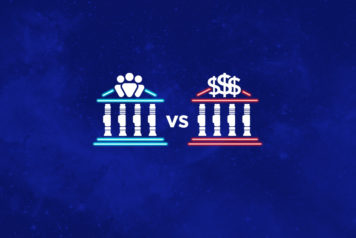How to Manage Finances When You Lose Your Job
During the COVID-19 crisis, the United States shuttered 30 million jobs, according to the Bureau of Labor. That was four times the amount of people that were unemployed during the Great Recession of 2008. During that year, the U.S. economy lost a total of about 8.7 million jobs. Sadly, crisis often brings an increase in unemployment.
When you have a problem to solve, like suddenly finding yourself without a job and source of income—creating a plan is a smart first step. Let’s start with the first crucial step by trimming budgets and applying for benefits before moving to emergency savings.
Review (or Create) a Monthly or Weekly Budget
It’s time to take a hard look at your monthly inflow and outflow. Make cuts wherever you can – Ask yourself: What is really necessary right now? Is it time to finally cut the cord with cable? Am I paying too much for car insurance or phone plan?
Starting with what you need can help you find out how much wiggle room you have in your budget. You can always add things back once the essentials are accounted for. This includes reevaluating the things you once thought as “essential” costs like gym memberships, music streaming services, pricey personal hygiene products and bottled water, just to name a few.
“Find out what your expenses are going to be for the next three-to-six months,” said Rick Hoskins, a financial advisor on behalf of WeStreet Credit Union. “This is the typical timeframe that it will take you to find a new job or career.”
Once you have a list of essential expenses like mortgages, insurances, and other outstanding debts, you can break this new, streamlined budget down week-by-week.
During times of crisis, many financial institutions work with people whose finances have been affected by the emergency, so be sure to reach out early and often to see what relief options may be available to you.
Save and Then Save Some More
Once you have a plan for the essentials, it’s a good idea to put anything left over directly into your savings. Having savings on hand during uncertain times puts you in a good position to react to anything that might happen.
It might sound counterproductive to think about saving when you are really in survival mode, but saving every extra penny in the moment just might help you make it through a financial crisis.
When saving, dump the money directly into a high-yield savings account. Add to this rainy-day fund as you can, and know that it is there if personal financial cuts and supplemental support aren’t enough.
If you haven’t had the opportunity to build up an emergency savings (or rainy day fund) that covers about 3-6 months of living expenses, get started! It will help if you ever run into a financial crisis or unexpectedly become unemployed.
Apply for Unemployment Benefits
Unemployment qualifications very by State. In the state of Oklahoma, you must meet the following criteria to receive unemployment benefits, but everyone who is unemployed is welcome to apply:
- You are unemployed through no fault of your own
- You are able and available to seek and accept work
- You earned a minimum of $1,500 from a covered employer during your base period.
- You meet the “1 and 1/2 rule”. More information on this rule can be found in section § 2-207 of the OES Act (Oklahoma Statutes Title 40)
This information and more can be found on the Oklahoma Employment Security Commission’s website.
“If you are without resources, tap into what state and federal benefits are available,” Hoskins said. “Food stamps and food credits might be available that you normally wouldn’t qualify to receive.”
Remember, even if you start receiving benefits, this is a short-term funding source. Continue to follow all of the other tips here and prepare for less income in the coming months.
Paying off any credit card or extraneous debt that you can is a good way to get your financial life straightened out. However, if you cannot adjust your budget to include paying off these debts because of job loss, you still have a few options for how best to handle this debt during this unprecedented time.
Call your lender or card issuer and communicate your situation to them. Many have set up programs to address specific emergency situations. Following one of these payment programs will allow you to maintain good standing with these lenders while also allowing you to survive until you can find employment. Use caution, however: These programs will not help decrease your debt and it will still likely need to be paid down when the agreement is over.
This debt management extends to your mortgage. If you are concerned about meeting your mortgage payment, communicate your concerns to your mortgage lender. You might qualify for certain programs like mortgage deferrals, which take extenuating circumstances into account and allow for mortgage payment forgiveness for a time period.
As a Last Resort, Tap into Retirement Accounts
Dipping into retirement accounts is usually discouraged, but there are extreme circumstances where it may be your only or best option.
“If it is absolutely necessary, use your retirement accounts to get you through,” he said. “Preparing for your future is very important, but surviving the present is also very necessary.”
Hoskins says to talk with your retirement financial advisor. Chances are you will face a penalty if you withdraw early, but if it your only option it may be worth it. Keep in mind that retirement accounts often can not be accessed for 30-60 days from the initial request. The same is true with most all investments.
If you have them, it’s a good idea to leverage other investments to help with financial losses before you break into your retirement accounts. But Hoskins says if you are thinking of liquidating investments because they have tanked, it may be better to give them time to rebound. Call and talk through your concerns with your financial advisor before making any decisions.
No matter what your situation is, there are always steps you can take to help mitigate your situation or prepare for the future. The bottom line, Hoskins said, is to remember to take every part of a financial crisis one day at a time. Like many areas of life, keep making the next right choice and eventually, you will push through the crisis.
Stay focused on solving problems that are in your control, and one day you’ll all be on the other side of all of this.
This article is for educational purposes only. WeStreet Credit Union makes no representations as to the accuracy, completeness, or specific suitability of any information presented. Information provided should not be relied on or interpreted as legal, tax or financial advice. Nor does the information directly relate to our products and/or services terms and conditions.


